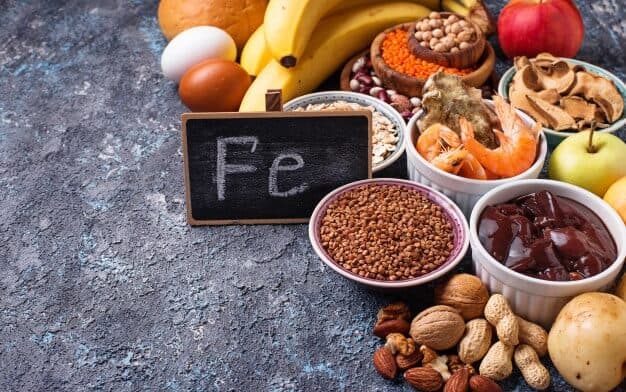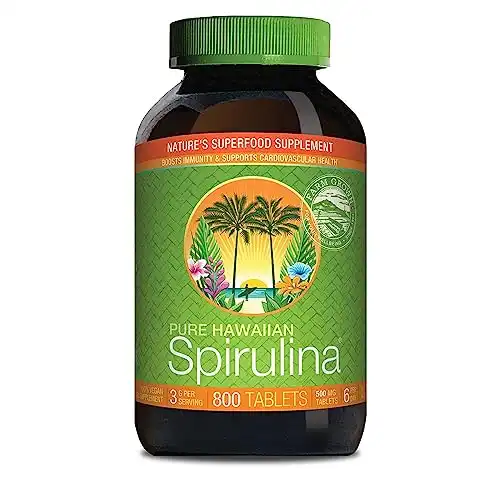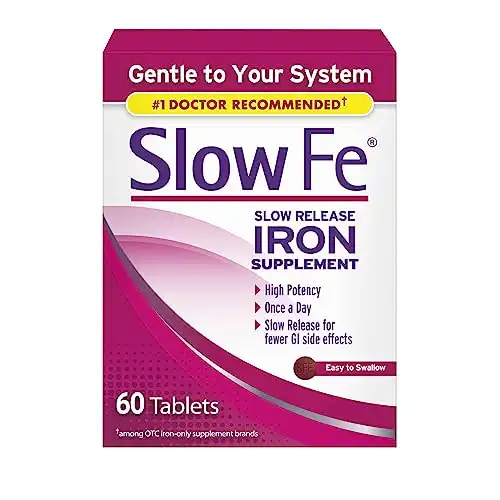Top 10 Iron Rich Foods For Anemia: Cure Your Iron Deficiency Fast!

What are the best Iron foods? A few years ago, I had to fight against anemia, and I know what it felt like. If you include the foods listed below in your diet, you will never feel the same way I did.
Rich Iron foods are all those that provide the mineral for the development of some blood elements (such as hemoglobin) necessary for the human body.
These nutrients transport the oxygen that leaves the lungs to the essential parts that our body requires to function.
There is a chemical element called Oligoelement, responsible for developing metabolism in our body. If we want to maintain excellent health, iron is necessary. The iron fulfills the function of contributing to the required amount of oxygen and growth.
Have you ever noticed that you feel tired and don't know why? Do you lack oxygen and don't suffer from allergies or any respiratory disease? Well, you may have iron deficiency anemia.

Not having enough iron in our body compromises our health, increasing the chances of contracting diseases, especially anemia. Despite this, it has been confirmed by several studies that eating protein or vitamin-based iron helps fight anemia.
Also, if you are not one of those who consume some medicine, don't worry; various foods are rich in iron, improving your health and free capacity.
Stay with us on this new article, and we will be telling you about various iron-rich foods. An adequate diet based on Phosphorus, Potassium, Folic Acid, Copper, and Magnesium contributes optimally and beneficially to our body, which, together with iron, improves our health level.
What are the best iron foods?
If you have iron-deficiency anemia, you should know you can find iron-rich foods in various daily meals.
The amount you need of this mineral is from 10 to 18 mg per day, and you can gain it from the following list:
Legumes

They contain between 7 and 8 milligrams of iron per 100 grams. Legumes, also called beans, are foods characterized by a physical aspect like a dry seed.
Legumes provide us with many nutrients indispensable for the body and its functionality. Moreover, since it is a natural food, it absorbs its minerals and positively affects our bodies.
Nowadays, pollution and changes in the ecosystem seriously compromise the fields of crops. The cultivation of legumes directly favors the nitrogen needed by the soil to enrich the cultivated fields. (where these foods are planted, along with all the similar ones)
The legume provides the following benefits for our body:
- Protein. Legumes are excellent sources for developing proteins that we require naturally and without some chemicals. It is also known that the level of protein given by this food range from 20 to 50%.
- Vitamins. These foods provide us with many Vitamin C, Folic Acid, Vitamin B1, Vitamin B2, and Vitamin B3. In addition, it also contains B complex and Vitamin E. These vitamins are essential for our health.
- Minerals. As we said before, legumes are also rich in minerals. Some are Potassium, Magnesium, Zinc, Iron, and Phosphorus. Minerals help to counteract or avoid any disease, such as anemia. For example, iron helps fight anemia, Magnesium helps form bones and teeth properly, and Zinc is responsible for increasing the immune system's functioning.
- It provides dietary fiber. A dietary fiber, also known as vegetable fiber, helps us avoid digestive problems or constipation. So a higher amount of natural fiber reduces the likelihood of suffering stomach problems. Fiber also helps lower cholesterol.
Eggs

Eggs are one of the foods that should rarely be missing from our kitchens. They bring significant benefits to our health, especially to our bodies.
Eggs contain at least 7mg of iron per 100 grams. The egg yolk also has about 109 mg of Potassium, about 48 mg of Sodium, and about 3.6g of Carbohydrates.
It also has about 1,090 mg of cholesterol. Too much cholesterol can cause damage to your health, heart, and bloodstream.
Eggs are one of the tastiest natural foods available. We can mix them with any other food type that obtains better nutrients and proteins that the body absorbs.
But we must bear in mind that we must eat them in moderation, since having a considerable amount of cholesterol concentrated can be harmful to health. So we recommend having the right balance and control in diets involving eggs.
Millet

Millet contains about 9 milligrams of iron per 100 grams. It is one of the most nutritious and natural cereals available, yet little is known.
However, the properties that Millet has been beneficial to our body. Some properties it provides us are:
- Dietary fiber and natural proteins.
- Millet is rich in Potassium, Iron, Magnesium, and Phosphorus.
- In addition, it has a low amount of fat.
- Millet is quite energetic. (Despite its low-fat content)
- It has antioxidant compounds. (Vitamin C, Vitamin E, Selenium and Zinc)
Cereals are the best natural source for health and nutrition. Foods like these bring us great benefits for the diet and care of the body. Including Millet in our food can significantly increase the number of services and energy our body needs.
We recommend Peeled Millet, which is easy to cook; you have to add three water measures for each step of Millet until these cereals are dense, and you can turn it into kibble. (It is ideal for hamburgers)
Pistachios

Pistachios are nuts that stand out to give us the right amount of iron, approximately 7mg per 100 grams. They also contain copper elements, which improve the body's absorption of proteins and vitamins.
Also, we know from studies that combining iron with copper can produce an anti-anemia effect or help fight anemia entirely.
Apart from being rich in iron and food, Pistachios also contain some extra minerals in their composition: Magnesium, Potassium, Calcium, and Phosphorus.
It also has 10% fiber and 20% general protein.
In recommendation, consuming pistachios or the correct quantity can help reduce the effects produced by anemia. But for better health care, you should consult your doctor about this food and its contraindications and health effects (especially if you are pregnant)
Brewer's yeast

Brewer's yeast provides between 6 and 7 milligrams of iron per 100 grams. It is a kind of fungus used to produce wine and beer. They also use it to make bread or any bakery and pastry product, where the sugar fermented in the dough turns into carbon dioxide.
Brewer's yeast contains iron, 19 mg of Calcium, 30 mg of Sodium, 40 mg of Magnesium, 18 g of Carbohydrates, and a surprising 601 mg of Potassium.
It's rich in Potassium, but what was Potassium? Let's remember that, Potassium is fundamental for the essential functions of the organism, like the regulation of the water that circulates within our organic system and the cellular processes.
Brewer's yeast is helpful to have a better flow of our water circulation. They are also rich in Magnesium and Iron, in addition to other protein and vitamin benefits.
You can find brewer's yeast in the bread we often eat for breakfast or dinner. However, we recommend eating bread with eggs, which can help our health.
Seafood

Seafood usually has between 1.7 and 4 milligrams of iron per 100 grams. Along with fish, they are good sources of iron for our bodies, helping the red blood cells move oxygen from the lungs to the necessary tissues.
Although seafood is rich in iron, it does not provide the same amount of iron as red meat except for clams and cockles, which have surprisingly 14 milligrams per 100 grams.
Nevertheless, consuming some seafood from time to time can be beneficial if you want not to eat so much red meat, considering that seafood is healthier in that aspect.
We recommend that you try seafood if you want to eat some meat food with iron. Unlike red meat, it does not have the same fat or side effects for cholesterol and heart health. However, the amount of iron given by seafood is lower than red meat.
Liver

The liver has between 7 and 8 milligrams of iron per 100 grams.
You have to eat meat, and the liver is one of the most widely consumed iron-rich foods globally. However, it has many calories and is high in cholesterol, Potassium, and vitamin B12.
Vitamin B12 is essential for healthy brain function, nervous system function, and blood creation. Eating foods containing vitamin B12, such as various types of meat or liver, will help you resist harmful effects such as tearing injuries (cuts to the skin), exercise (increased endurance and concentration), and improved heart pumping ability.
We recommend that you consult your doctor when consuming the liver in abundance. Some people do not benefit from eating this type of food, especially pregnant.
Quinoa

Quinoa is about 13 milligrams of iron per 100 grams. It is a nutritious seed and a great source of protein and natural vitamins that we can get for our food. However, according to studies, it is estimated or classified as a whole grain.
Quinoa has very high levels of minerals such as:
- Calcium.
- Magnesium.
- Phosphorus.
As well as vitamins B1, B2, C, E, and Niacin.
Vitamin C is essential for iron absorption since it aids in non-heme iron assimilation. If you have iron-deficiency anemia, you can also take vitamin C supplements. However, be cautious because most dietary iron is non-heme iron.
It contains good fats rich in Omega 6, amino acids, and folic acid, helping the brain develop.
Consuming quinoa helps in nutrition and feeding because it is nutritious and brings significant benefits to your health and diet.
Also, you have to know that it is 100% natural food and brings excellent positive effects if we do some sports or physical training to counteract various common diseases.
We emphasize. You should consult a doctor before starting to eat or add to your daily diet quinoa, as you may be allergic to such food (especially if you are suffering from any disease or are in any treatment for your exercise routines))
Spirulina

How much iron does it have? Spirulina contains almost 30 milligrams of iron per 100 grams. It is seaweed, famous algae for being a great source of vitamins, proteins, and minerals; we recommend it for its nutritious use and significant health contribution.
Many nutritionists recommend making orange juice with Spirulina or making juice with Spirulina.
A highly recommended drink is Spirulina green juice; you can make it with four oranges, an apple, some of the Spirulina seaweed leaves, and some black pepper.
You can beat all this and get a good Spirulina juice to your liking. Finally (my choice,) you can also take it in tablet form as a dietary supplement. Here I leave you the best one I tried.
Green leafy vegetables

Green leafy vegetables contain between 1.2 and 4 milligrams of iron per 100 grams. Therefore, they are considered the most recommended and desired natural iron-rich foods for health care and the human body's optimal functioning.
They also increase the immune system, organ care, brain function, and defenses against disease. Of course, you have to eat vegetables, primarily green leafy, with edible and nutritional leaves.
Green leafy vegetables contain various types of benefits for our health. If you are doing any training or physical exercise, we recommend you eat your vegetables (also dark green leafy vegetables.)
Should I take iron supplements?
Yes, I recommend you take them if your doctor also does and you feel like you have iron deficiency anemia or want to get your energy back.
Iron supplements are a good option if you have iron deficiency anemia and do not want to take iron in tablet form.
Without iron stores, people can develop a condition called iron deficiency anemia. It's familiar and is associated with symptoms like fatigue, trouble maintaining body heat, pale skin, dizziness, headache, and an inflamed tongue.
So you may take iron supplements as prescribed, with the dosage on the label. Your body does not want too much iron in it.
Why do you have to eat Iron-Rich foods?
It's essential to ensure you're getting enough iron in your diet, especially if you're a woman. Women need more than men, and not getting enough can lead to health problems.
So why is it so important to eat iron-rich foods? Here are three reasons:
- Iron helps your body carry oxygen to your cells. This is important for overall health and energy levels.
- Iron is essential for healthy brain function. It helps you think clearly and stay focused.
- Besides, it is necessary for strong muscles and bones. Without enough iron, you may be more prone to injuries and bone fractures.
So make sure you're incorporating plenty of iron-rich foods into your diet. Good options include meat, fish, poultry, beans, lentils, nuts, and fortified cereals.
By doing so, you'll be sure to get the nutrients your body needs to stay healthy and energized.
Can Iron-Rich foods cause constipation?
Yes, Iron-Rich foods can cause constipation. Some studies have shown that iron can make it harder for food to move through the digestive system.
Iron can sometimes slow down normal bowel movements. This may be because metal can have a charge that affects the muscles and nerves of the intestine.
Supplements
Iron supplements are available as ferrous or ferric. Ferrous iron is better absorbed. It can be taken as a pill or liquid.
These supplements that work quickly can add more of this metal to your body. They might cause more constipation. Iron supplements that work slowly are gentler on your digestive system, but they are not absorbed as well.
Liquid supplements are less likely to cause constipation. This is because the dosage can be controlled more easily. The form of iron that causes the least constipation is food.
Soy, oatmeal, and iron-fortified cereals are good sources of this mineral. They also have fiber, but some people might still need to take supplements to get enough iron in their bodies.
If you take supplements without eating a meal, you might become constipated. This is because it will be better absorbed if it is taken with food. Eating a meal, especially one that is high in fiber, can help the iron move through your digestive system.
Red meat can help the body absorb it better. Vitamin C can also help the body absorb it better. Blood tests are done to see how well your body absorbs this nutrient.
Daily dosage
Most people don't have constipation problems when they take the recommended daily dose of iron. An adult male needs 8 milligrams per day.
Women of childbearing age need more of a certain nutrient. This amount varies depending on someone's general health and should be calculated by a physician.
The bottom line
Anemia is a common blood disorder that can leave you feeling tired and weak. If you’re looking for ways to boost your iron levels, eating foods rich in this mineral is a great place to start.
We’ve highlighted some of the best iron-rich foods for anemia, so be sure to add them to your diet.
And if you want more information on this topic, be sure to check out our other articles on anemia. Thanks for reading!
DISCLAIMER: buildyourbody.org does not provide medical advice, examination, or diagnosis.
Medically reviewed and approved by Nataniel Josue M D.


